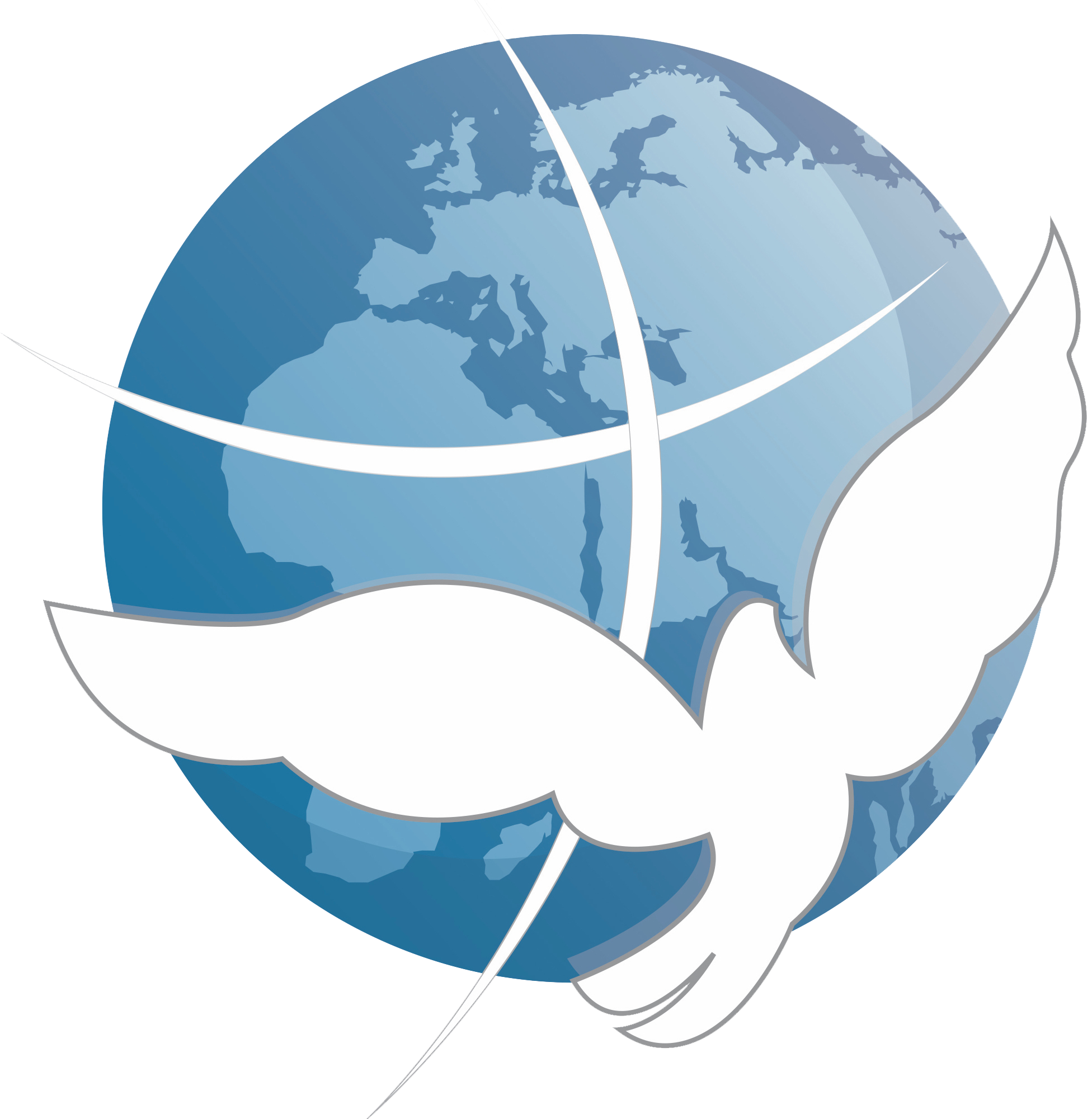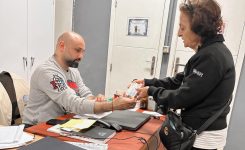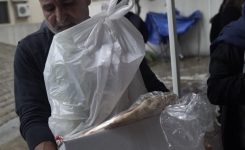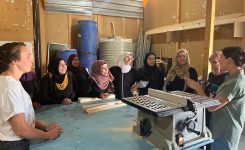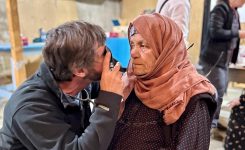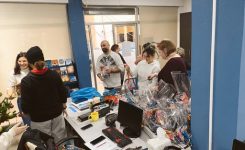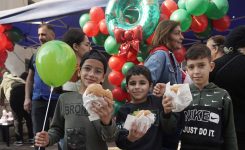Stories
In Syria, there is Nothing
This article was written a reporter Tom Orde who came to visit us here in Lebanon. And It is originally published on Medium.com Here you can read in it’s original form.
Tom Orde reports from Lebanon where many refugees have sought safety from the horrors of civil war
A horse rears up on its hind legs and its rider brandishes a sword with a snarl on his face.
He’s a martyr decorating one of the countless banners dotted around the city.
Black flags with white Arabic script line the dusty street like bunting. It’s late October, humid and pushing 30c.
After a few minutes of waiting it’s safe to go inside.
Two blinking toddlers sit opposite me, gibbering and jabbing at each other. They are refugees from Syria.
The house we’re in is in the Fanar neighbourhood of Beirut. It’s a two-room building with hard concrete floors like a factory and the windows shuttered closed. There’s a TV, a sofa and a few recent family photos. Spartan.
Hushed by the two women sat on either side of them the children now sit staring and curious. Iman and Munira are aunt and niece respectively.
They came to Lebanon several years ago and are originally from the Damascan suburb of Ghouta.
A UN report in June described the five-year siege of eastern Ghouta as “barbaric and medieval, amounting to war crimes, and crimes against humanity”.
After leaving Ghouta the family lived in an area of ISIS-held territory where even the young children were forced to cover themselves completely.
I am accompanying Vican and Maral, from an organisation called Triumphant Mercy (TM) on a home visit.
It was founded in 2006 to support Lebanese civilians affected by the Israel–Hezbollah war.
In a true case of turning the other cheek, they started helping Syrian refugees in 2013 despite the lengthy Syrian invasion and occupation of Lebanon from 1976 to 2005.
The women talk and Vican translates for me.
Iman, now 28, suffered severe postnatal depression after having triplets at the age of 14. To escape the Syrian conflict, she and her family made the dangerous mountain crossing to Lebanon. She tells us her brothers are stuck in Idlib where the war still rages.
Here in Lebanon, Iman’s 13-year-old son earns about $2.5 dollars a day doing manual jobs and can’t afford to take days off.
Her husband struggles to find work with a slipped disc and serious back problems. The women have no option but to stay at home and look after their children.
Based out of a community centre, TM makes weekly home visits as a way to maintain regular contact with refugee families stuck at home and to show that there are people there to support them and adapt to life in Lebanon.
This is the third year of contact with Iman who sends her children to the centre.
Set up in 2016, the centre is a hub for the surrounding areas and supports over 1,000 Syrian and Iraqi refugee families.
It offers classes in English, Arabic, maths, art and IT for children aged between 6 and 12 who are unable to access government or UN school provision.
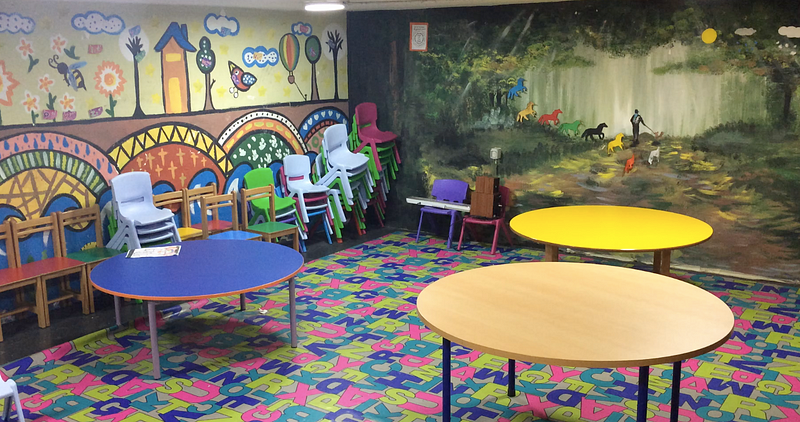
There are opportunities for vocational training and adult education as well as food assistance, rent assistance and monthly clothes distributions.
But they also offer psycho-social (counselling) classes to help those affected by the war process what they have been through and to live a normal life or childhood.
Making our way to the next home our mini-bus jolts along the steep and winding Beirut roads. We pass military checkpoints of machine guns, razor wire, and armoured vehicles.
Lebanese history is complex, to say the least, and demographically the country is a mix of Shia, Sunni, Druze, various sects of Christianity and a sizeable Armenian minority.
The country’s 15-year civil war may have ended almost three decades ago but interfaith tensions still persist to this day.
With a population of just over 4 million people, Lebanon hosts over a million Syrians. This is on top of 450,000 Palestinian refugees already registered with United Nations Relief and Works Agency for Palestine Refugees in the Near East (UNRWA).
According to the UN Refugee Agency, there are 5,637,050 externally placed Syrian refugees, 8,000 of whom have resettled in the UK.
We make our way up cracked concrete steps and again enter spartan settings where we meet two sisters-in-law. Raida and Hadisha.
We’re offered plastic garden chairs while our hosts sit on mildewy cushions on the floor.
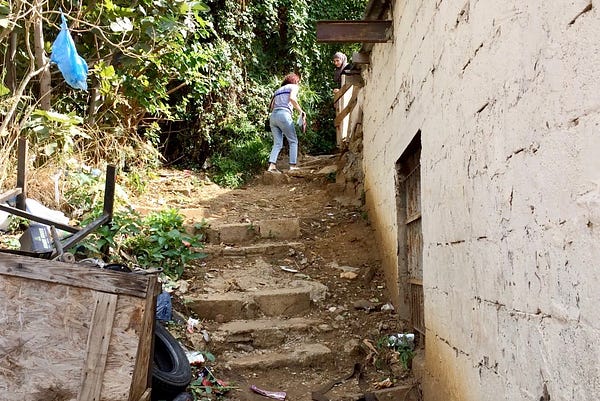
There’s a TV and nothing else.
In total two families live in the house. Raida has two children. One girl and a boy. Hadisha has a girl and a baby on the way. Two of the children attend the TM community centre.
The boy said: “I have three friends at school and I would like to go to Syria someday.”
Raida complains her husband can’t find enough work and is only able to find three days of work a week.
Hadisha suffers from stomach problems and is in her fifth month of pregnancy. She is especially worried as they don’t have money for the hospital fees.
Her brother had cancer but could not afford treatment in Lebanon, by the time he returned to Syria it was too late. He died aged 23.
The two families feel isolated because they don’t know their neighbours. Regardless, Raida says: “It’s better to come to Lebanon. In Lebanon there is UN safety. In Syria, there is nothing [security] especially in the villages.”
So many refugees have gone through horrific experiences during the Syrian conflict and the harsh reality is that despite their circumstances and past traumas these families are the ‘lucky ones’.
